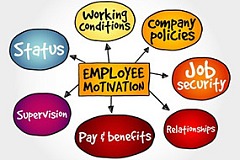The modern workplace is confronting a crisis of dwindling employee engagement, productivity, and retention. To effectively address these challenges, companies must reconsider the role of management and adopt innovative strategies to create a more engaged and motivated workforce.
Top leaders must understand how transforming managers into coaches can result in increased productivity, improved employee retention, and a happier work environment for everyone involved.
The Crisis in Employee Engagement and Productivity
According to a recent Gallup survey, employee engagement has dropped to a seven-year low, with only a third of workers reporting feeling engaged at work. This lack of engagement has contributed to the so-called "great resignation" phenomenon, where employees leave their jobs in droves, seeking better opportunities and workplaces that value their contributions.
Disengaged employees are more likely to quit, and even when they stay, they tend to be less productive. A lack of engagement leads to quiet quitters – employees who do only the bare minimum at work, leading to decreased overall productivity. As a result, businesses need to prioritize employee engagement to boost productivity and retain top talent.
One solution to the engagement crisis is to change the role of management in the workplace. Traditionally, managers have focused on directing and controlling employees, often fostering a hierarchical and bureaucratic environment. However, this approach can be detrimental to employee engagement and productivity.
Implementing a Coaching Culture: Key Strategies
To transition your management team to coaches, consider these critical steps, strategies, and attributes:
Get the right ratio. To successfully implement a coaching culture, companies should consider maintaining a ratio of one coach for every six employees. This ensures that coaches can effectively mentor and support their team members, fostering an environment of growth and development.
Emphasize goal setting and feedback. Coaches should work with employees to set clear, achievable goals and provide regular feedback on their progress. This encourages employees to take ownership of their work and continually strive to improve, boosting overall productivity.
Encourage employee autonomy. To foster a sense of autonomy and self-motivation, coaches should encourage employees to identify their strengths and find ways to utilize them in their work. This empowers employees to take control of their professional development and excel in their roles.
Support professional development. Providing employees with opportunities for professional development is crucial to maintaining a coaching culture. Businesses should offer resources, such as Udemy courses or books, to support employees in their learning endeavors. Coaches can also recommend relevant materials from company libraries, further fostering a culture of self-improvement.
Organize workshops and training sessions. Regular workshops and training sessions, led by outside experts, can provide employees with valuable skills and knowledge. These sessions should focus on topics that are relevant to all staff members, such as mindfulness, communication, and confidence building.
The Impact of a Coaching Culture on Productivity and Employee Retention
With your coaching program up and running, you’ll begin to discover the benefits. Be on the lookout for the following:
Increased Employee Engagement. By implementing a coaching culture, companies can significantly improve employee engagement. According to a survey by Inpulse, employees are three times more engaged when they feel supported by their managers.
Improved Productivity Metrics. Companies that have adopted a coaching culture have seen significant improvements in productivity metrics. For example, Time Etc, a virtual assistant platform, reported a 20 percent increase in performance on key goals after implementing a coaching approach.
Enhanced Employee Retention. With the coaching culture in place, companies can also experience reduced employee turnover and a higher retention rate. This allows businesses to avoid the negative consequences of the "great resignation" and maintain a stable, motivated workforce.
Overcoming Challenges in Implementing a Coaching Culture
Transitioning from a traditional management role to a coaching role requires a different set of skills. Companies must invest in training and development for coaches, ensuring they have the necessary tools and knowledge to support their employees effectively.
Creating a non-hierarchical environment can present challenges in terms of maintaining boundaries and ensuring that employees understand their roles and responsibilities. It is essential for coaches and employees to establish clear expectations and communication lines to prevent confusion and maintain a well-functioning workplace.
Overcoming these challenges requires deliberate, proactive, and ongoing training for your coaches.
How to Train Managers to Be Coaches
A manager who is able to skillfully coach their team will not only help drive success for the organization but also contribute to the personal and professional growth of their employees. Here are some valuable insights into the core training your managers will need to make the transition and become effective coaches.
- Encourage your managers to constantly learn and grow through various methods. These include a structured training program, workshops, seminars, online courses, and mentorship programs. A blend of structured training programs, and self-directed learning, with on-the-job application and follow-on mentoring, will, over time, ensure that managers are equipped with the necessary skills and knowledge to effectively coach their teams.
- Train your managers in the art of active listening. A good coach is not only able to provide guidance and direction but also listens attentively to their team members' concerns and ideas. By fostering an environment where employees feel heard and valued, managers build trust and rapport with their team, ultimately leading to higher levels of engagement and productivity.
- Teach your managers how to provide constructive feedback. This involves not only pointing out areas for improvement but also recognizing and praising employees' strengths and accomplishments. By framing feedback as an opportunity for growth rather than criticism, managers can inspire their team members to continuously learn, develop, and strive for excellence.
- Help your managers-as-coaches acquire the ability to ask thought-provoking questions. Rather than directly providing answers or solutions, managers should be trained to guide their employees in finding their own solutions through inquiry-based coaching techniques. This approach empowers employees to think critically, take ownership of their decisions, and ultimately become more self-reliant problem solvers.
- Encourage your managers to lead by example. They should embody the characteristics they hope to instill in their team members, such as a strong work ethic, resilience, and adaptability. By demonstrating these qualities, managers can inspire their employees to adopt the same mindset and approach to their work.
Effective management training is key to transforming your managers into coaches who can drive success for your organization. By investing in their continuous learning, teaching them essential communication skills, and encouraging them to lead by example, you will not only unlock the full potential of your managers but also create a more engaged, productive, and collaborative workforce.
How to Get The Specialized Management Training Needed to Develop Coaching in Your Business
To discover how to efficiently and cost-effectively train your managers simply contact us. We’ll set up a time when we can discuss your specific situation and help you determine if investing in training would be a sensible move for your company.
Brian Tracy USA: 877.433.6225 Email Me feedback@focalpointcoaching.com. There is never any obligation.














